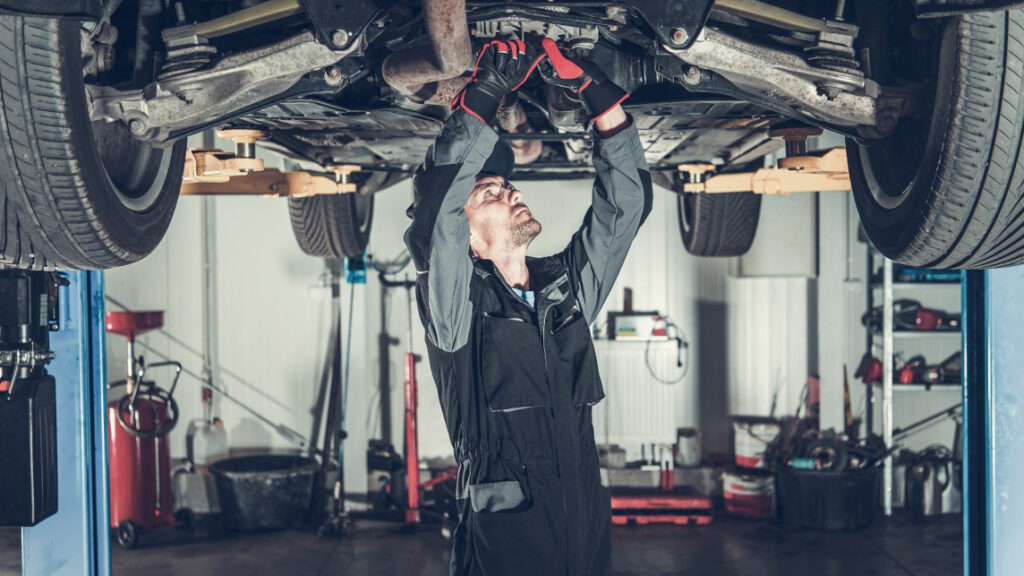A gimmick and practical help – artificial intelligence (AI) is conquering everyday life, work and car repair shops. Engines can be repaired faster and with foresight, and resources can be conserved. Crucial for success: A sufficiently large database. How Gaia-X keeps cars and factories running.

Recognising songs, determining faces in photos or responding to speech – artificially intelligent applications like these make our lives easier. They manage our snapshots, identify the latest catchy tune and even obey our every word when we ask them to draw something: DALL-E is the name of an AI that produces images based on our input and ideas. Google is also working on this: The specially developed AI IMAGEN can already illustrate life-like motifs. What is just a gimmick to one person is a practical aid to another. Take car repairs, for example. Here, AI is used to detect faults in engines – before technicians even reach for a wrench.
AI for the Car Repair Shop
To bring AI and motor vehicles together, enterprises, AI developers and research institutions are joining forces in the Car Repair 4.0 consortium. The goal of the project: Repair shops, measurement system manufacturers and IT service providers are to network, exchange industry-specific data securely and confidentially, train AI models and thus simplify repairs. Smart algorithms not only speed up troubleshooting, but improve diagnoses. The result: Motor vehicle operations with AI work more efficiently and sustainably.
Algorithms diagnose engine problems
The focus of Car Repair 4.0 is on oscilloscopes. The devices can be used to measure electromagnetic fields. Depending on how the voltage curves fluctuate and deviate, this can indicate defects in machines and aggregates. It’s the same under the bonnet: No matter whether it’s knocking noises, misfiring or oil leaks – algorithms determine possible problems by means of tiny differences that show up in the measurement data, and car mechanics then find the right solutions.
Data basis determines success
Crucial factors for success: As large and qualitative a database as possible. This is because a sufficient number of measured values are required to train AI models. Only when these are available can algorithms be optimised further and further, and diagnoses be made more and more precisely. This requires, though, that car repair shops, measuring system manufacturers and IT service providers are ready to share their data. However, a practice that has so far been more of a wish than a reality in German industry, for example, as a recent study by the German Economic Institute (IW) shows: Legal, technological and organisational pitfalls have so far slowed down opportunities.
Gaia-X keeps engines running via AI and data
The solution is provided by Gaia-X. The Car Repair 4.0 consortium will also share information sovereignly through a connected and decentralised data infrastructure. For example, the AI project’s platform already integrates the so-called federation services of Gaia-X: Horizontal services that are available to all users in the ecosystem, for example, to manage identities, catalogue services or meet compliance requirements. The ultimate goal is to create an open and transparent ecosystem that provides enough information to continuously improve and share AI models across the board. And a data-based innovation and value network that brings car repair shops, AI providers, research institutions and manufacturers into the business and keeps engines running.
Service-Meister and Gaia-X: A port and hub for data and AI
Keeping plants and machines available with AI and data – that’s exactly what Service-Meister does. Over the past two years, the AI project has developed an ecosystem for technical service in the age of Industry 4.0. An ecosystem that not only connects technicians, plant engineers, machine operators and production companies, but also supports and accelerates service processes with AI and data. While it is a goal that Service-Meister is already reaching without Gaia-X, it is a vision and concrete goal in which Gaia-X also lends itself as a port and exchange point for data and AI models of industry service. Chatbots, for example: When they communicate with each other via Gaia-X shared data flows, they expand and improve their know-how independently.
Sharing information, developing data-based services and benefiting from AI – the authors of the IW study are also certain: The Gaia-X data infrastructure is one possible approach to solving legal, organisational and technical barriers and releasing economic effects. And it doesn’t matter whether it’s in industrial or automotive service.
Did you like this article? Then subscribe to our Newsletter and receive regular updates on similar topics and on the car repair project, and discuss this and similar exciting topics with us in our LinkedIn group.
